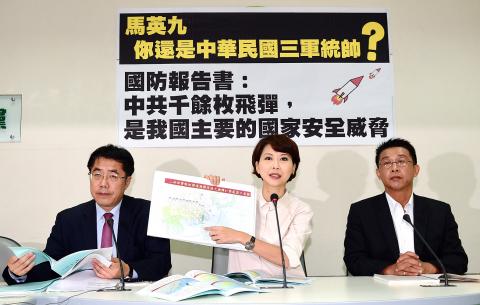Democratic Progressive Party (DPP) presidential candidate Tsai Ing-wen (蔡英文) yesterday panned President Ma Ying-jeou (馬英九) over a statement he made during a meeting with Chinese President Xi Jinping (習近平) that China should remove missiles aimed at Taiwan to appease criticism from the opposition.
Ma has come under fire for failing to elaborate on the so-called “1992 consensus” as meaning that Taiwan and China belong to “one China,” although each side could make its own interpretation of what “China” means, during Saturday’s meeting and he spoke only of the “one China” principle, according to a transcript of Ma’s statements during the closed-door meeting publicized yesterday by the Mainland Affairs Council.
The transcript drew further criticism over Ma’s request that China remove the more than 1,000 missiles aimed at Taiwan, as it was a “basis for opposition criticism.”

Photo: Lo Pei-der, Taipei Times
Ma later said that Xi told him that the missiles are not aimed at Taiwan.
“The president represents the nation and he should not take into consideration partisan politics when dealing with foreign affairs,” Tsai said in response.
“Military issues, especially, should not be simplified as a dispute between the blue and green political camps, as it could involve lives, property and the safety of Taiwanese,” she said.
“The way that the president describes it is very disappointing,” Tsai added.
Asked if she would follow the so-called “1992 consensus” if elected president, Tsai did not directly address the question.
Tsai said that she has made it very clear that the main objective of her cross-strait policy would be maintaining the free and democratic lifestyle of Taiwanese, as well as maintaining peace and stability across the Taiwan Strait.
“All cross-strait exchanges must meet the criteria of ‘equal footing and dignity,’ ‘open and transparent,’ as well as ‘not involving political preconditions,’” Tsai said.
If elected president, Tsai said her responsibility would be defending the right of Taiwanese to have more options instead of limiting people’s right to choose.

A preclearance service to facilitate entry for people traveling to select airports in Japan would be available from Thursday next week to Feb. 25 at Taiwan Taoyuan International Airport, Taoyuan International Airport Corp (TIAC) said on Tuesday. The service was first made available to Taiwanese travelers throughout the winter vacation of 2024 and during the Lunar New Year holiday. In addition to flights to the Japanese cities of Hakodate, Asahikawa, Akita, Sendai, Niigata, Okayama, Takamatsu, Kumamoto and Kagoshima, the service would be available to travelers to Kobe and Oita. The service can be accessed by passengers of 15 flight routes operated by

GIVE AND TAKE: Blood demand continues to rise each year, while fewer young donors are available due to the nation’s falling birthrate, a doctor said Blood donors can redeem points earned from donations to obtain limited edition Formosan black bear travel mugs, the Kaohsiung Blood Center said yesterday, as it announced a goal of stocking 20,000 units of blood prior to the Lunar New Year. The last month of the lunar year is National Blood Donation Month, when local centers seek to stockpile blood for use during the Lunar New Year holiday. The blood demand in southern Taiwan — including Tainan and Kaohsiung, as well as Chiayi, Pingtung, Penghu and Taitung counties — is about 2,000 units per day, the center said. The donation campaign aims to boost

ENHANCING EFFICIENCY: The apron can accommodate 16 airplanes overnight at Taoyuan airport while work on the third runway continues, the transport minister said A new temporary overnight parking apron at Taiwan Taoyuan International Airport is to start operating on Friday next week to boost operational efficiency while the third runway is being constructed, the Ministry of Transportation and Communications said yesterday. The apron — one of the crucial projects in the construction of the third runway — can accommodate 16 aircraft overnight at the nation’s largest international airport, Minister of Transportation and Communications Chen Shih-kai (陳世凱) told reporters while inspecting the new facility yesterday morning. Aside from providing the airport operator with greater flexibility in aircraft parking during the third runway construction,

American climber Alex Honnold is to attempt a free climb of Taipei 101 today at 9am, with traffic closures around the skyscraper. To accommodate the climb attempt and filming, the Taipei Department of Transportation said traffic controls would be enforced around the Taipei 101 area. If weather conditions delay the climb, the restrictions would be pushed back to tomorrow. Traffic controls would be in place today from 7am to 11am around the Taipei 101 area, the department said. Songzhi Road would be fully closed in both directions between Songlian Road and Xinyi Road Sec 5, it said, adding that bidirectional traffic controls would